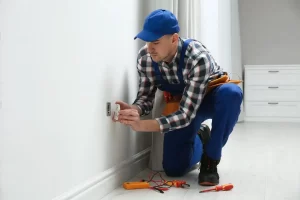Understanding Electrical Short Circuits at Home
 Electrical short circuits are one of the most common causes of electrical malfunctions in homes, often leading to power outages, appliance damage, and even fires. Understanding what short circuits are, why they happen, and how to prevent them can help keep your home safe.
Electrical short circuits are one of the most common causes of electrical malfunctions in homes, often leading to power outages, appliance damage, and even fires. Understanding what short circuits are, why they happen, and how to prevent them can help keep your home safe.
What is an Electrical Short Circuit?
A short circuit occurs when an electrical current takes an unintended path with little or no resistance, causing a sudden surge of electricity. Normally, electricity flows through a designated circuit, but when wires are damaged or faulty, the current bypasses the usual route, leading to overheating and potential hazards.
Causes of Short Circuits at Home
Several factors can contribute to short circuits in a home. Some of the most common causes include:
Faulty Wiring – Old, damaged, or poorly installed wiring can lead to short circuits. Over time, wires can degrade, exposing the inner conductors and increasing the risk of an electrical fault.
Loose Connections – Electrical connections that are not secured properly can result in short circuits. Loose wires may touch each other or other conductive surfaces, causing a sudden surge of electricity.
Overloaded Circuits – Plugging too many devices into a single outlet or circuit can cause overheating and damage to the wiring, potentially leading to a short circuit.
Water Exposure – Water is a great conductor of electricity, and when it comes into contact with electrical components, it can cause a short circuit. This is especially common in kitchens, bathrooms, and outdoor outlets.
Signs of a Short Circuit
Recognizing the signs of a short circuit can help prevent serious damage. Some common warning signs include:
Frequent Tripping of Circuit Breakers – If your circuit breaker trips repeatedly, it could be due to a short circuit preventing electricity from flowing safely.
Burning Smell or Sparks – A burning odor near outlets or appliances may indicate overheating wires. Sparks from an outlet when plugging in a device are also a warning sign.
Flickering or Dimming Lights – If lights flicker or dim without any apparent reason, there may be a wiring issue or short circuit in the electrical system.
Final Thoughts
Electrical short circuits can be dangerous, but with proper awareness and preventive measures, you can minimize risks in your home. Regular maintenance, proper use of electrical devices, and professional inspections can help keep your electrical system in top shape. By staying informed and cautious, you can ensure a safe and efficient electrical system for your household. Contact Emergency Electrician in Southampton. We are 24 hours available.
